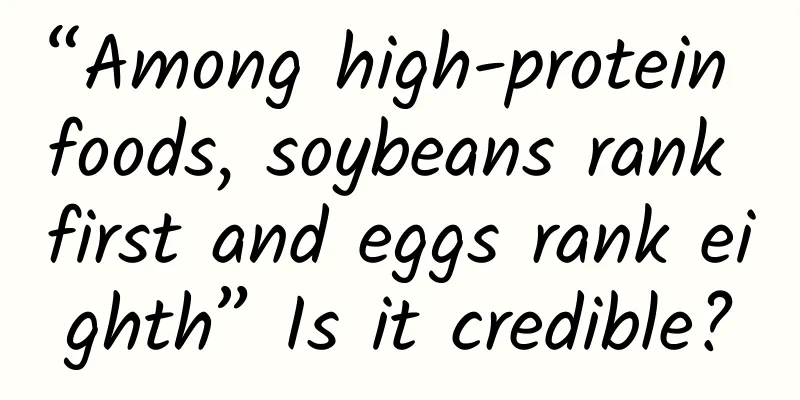“Among high-protein foods, soybeans rank first and eggs rank eighth” Is it credible?

|
[This issue's rumor] Recently, a self-media account released a "ranking of the top eight high-protein foods". The article claimed that the top three high-protein foods are soybeans, shrimps, and sunflower seeds, and the 4th to 7th high-protein foods are peanuts, fish, lean beef, and chicken breast. Eggs, which are often known for their high-quality protein, are ranked 8th. So, is this ranking of high-protein foods credible? How to judge the quality of protein in food? 【NetEase Health Assessment】 Unbelievable! 【Key points for identifying rumors】 1. The article did not mention the ranking criteria for the "eight high-protein foods", and any ranking that deviates from the criteria is just a hooliganism. Usually, we refer to high-protein foods as animal protein foods, including milk, livestock meat, poultry meat, eggs, fish, shrimp, etc.; the other category is plant protein foods, mainly including beans such as soybeans, green beans and black beans, and dried fruits such as sesame seeds, melon seeds, walnuts, almonds, and pine nuts. The top eight foods on the list are basically high-protein foods, and there is not much problem with this. But if you want to select the best high-protein foods and rank them, you need at least a ranking standard. For example, should you rank them by protein content, protein digestion and absorption rate, or protein suitable for special groups such as people who are losing weight, cardiovascular patients, vegetarians, and kidney patients? The ranking standards in the article are not comprehensive and clear, and rankings that deviate from the standards are all random rankings. 2. How to scientifically evaluate the quality of protein in food? To evaluate the nutritional value of food protein, we must first look at the content, second the quality, and third whether it is suitable for us. 1) Protein content is the basis for evaluating the nutritional value of food protein. Without a certain content, even if there is nutritional value, it is very limited. For example, the protein content of fruits and vegetables is about 1%-3%, and they cannot be used as the main food source for protein supplementation. Among common high-protein foods, the protein content of beans is about 30%-40%, the protein content of meat is 10%-20%, the protein content of eggs is 11%-14%, and the protein content of milk is 1.5-3.8%. But does this mean that soy protein is better than meat, egg and milk protein? Not necessarily, because content does not equal quality. 2) Whether the protein is of high quality depends on whether it can be fully digested, absorbed and utilized by the body. In order for protein to be absorbed and utilized by the human body, it must be broken down into small molecules of amino acids. The closer the amino acid pattern of the protein in food is to the amino acid pattern of human protein, the higher the degree of its absorption and utilization. Its evaluation index is called "protein biological value". The higher the biological value, the higher the degree of its utilization by the body and the higher the quality of the protein. Common animal proteins, such as eggs, milk, fish, and meat, are all high-quality proteins. Among them, the amino acid pattern of whole eggs is closest to that of the human body, and it is the most ideal protein in natural food. It can be almost completely digested, absorbed, and utilized by the human body, and its biological value is as high as 94. The second is milk, whose amino acid content and proportion meet the needs of the human body, and its biological value is 87. The biological values of fish and beef proteins are 83 and 74 respectively. Among plant proteins, soy protein is the best, with a biological value of 73, but compared with animal protein, its digestion, absorption and utilization rate is not high. 3) The most important thing to judge whether high-protein food is good or bad is whether it is suitable for you. Although the digestion and absorption rate of animal protein is higher than that of plant protein, it does not mean that everyone has to eat eggs, meat, etc. to supplement protein. Because food contains not only protein, but also other substances. For example, although meat, eggs and milk have high protein content, fat, cholesterol, etc. are also relatively high. For people with three highs, it is not suitable to eat them in large quantities. For vegetarians, who do not eat animal products on weekdays, they need to eat more soybeans and nuts to meet their daily protein intake needs. For some people who are allergic to soy protein, they need to choose protein sources carefully and avoid allergens. In short, there is no best high-protein food, only the one that suits you best. Finally, I would like to remind you that a balanced diet, eating everything but not too much of anything, is the most important principle in diet. As for the various food rankings, just take a look at them, don't really believe them, or you will lose. |
<<: The dog's "head tilt" is not just for cuteness! There are also these reasons...
Recommend
How to customize SEM promotion plan?
When doing promotion, the first thing to confirm ...
A complete template for advertising planning!
Today I will share with you how to plan the place...
How can new media operators quickly write high-conversion copy?
We all often have a perception that writing an ar...
China Life Sciences and Healthcare Industry Survey Results: Current Status and Outlook in 2023
How will your company's business performance ...
Revealing the 315 hacker wifi, how to ensure APP data security?
The 315 Party exposed WIFI security, demonstrated...
A dirty chip will affect performance. Here are four ways to clean it.
Do you usually wash dishes, vegetables, fruits or...
Shuangyashan SEO training: How can enterprise SEO improve website page inclusion?
For webmasters, how to improve the website's ...
How to place Xiaomi information flow? I summarized the 4-step method of creative optimization that affects CTR
Users are paying more and more attention to the e...
Wedding photography Tik Tok shooting tips!
In the past four years, the wedding market has gr...
SwiftUI Advanced Animation Canvas
Preface This fifth installment of our Advanced Sw...
We have summarized ten changes for you to understand in iOS 10 beta 4
On the morning of August 2, Apple released the fo...
Do you agree with the three aspects of iOS 10 that make people dissatisfied?
Apple has added some interesting and practical fe...
Artemisinin, an anti-malarial drug
Since ancient times, humans have been waging a lo...
User operations, how to solve user pain points?
When considering user needs, we look at the produ...









